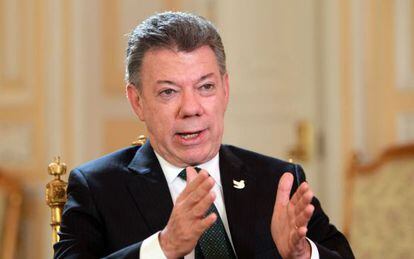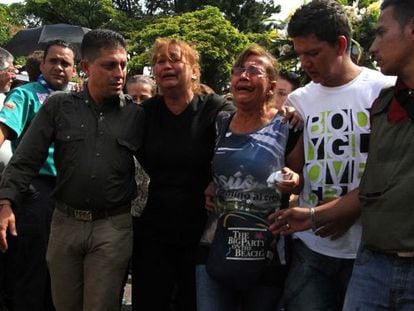Latin America seeks a way out for Venezuela
Colombian president offers to serve as mediator between government and opposition


Colombian President Juan Manuel Santos has offered to serve as mediator between the Venezuelan government and the opposition in order to find a way out of the crisis triggered by the recent arrest of Caracas Mayor Antonio Ledezma and the fatal shooting of a teenager at a demonstration on Tuesday. Colombia is one of the countries that Venezuela has accused of participating in an alleged plot against the administration of Nicolás Maduro. “It would be ideal if the two sides agreed to find a solution to this very difficult situation,” Santos said.
Meanwhile, Colombia is immersed in its own negotiations with the Revolutionary Armed Forces of Colombia (FARC) while Havana and Caracas serve as facilitators. “We can put our little grain of sand and yet always respect Venezuela’s autonomy,” Santos continued.
The Colombian head of state, perhaps the only president in Latin America to condemn the detention of Ledezma, expressed his “concern” for the official who has been imprisoned in the same facility where opposition leader Leopoldo López remains a year after his arrest. Santos is insisting that the parties begin dialogue, assuring that a troika formed by the foreign ministers of Peru, Brazil and Colombia stands ready to help if asked. “There will only be a future if both sides sit down to talks. Otherwise things will be very difficult.”
There will only be a future if both sides sit down to talks. Otherwise things will be very difficult” Colombian President Juan Manuel Santos
“Amid the clamorous silence of many governments and Unasur’s slip, this seems like a laudable measure to me,” said Carlos Malamud, a political analyst on Latin America at the Elcano Royal Institute think tank in Madrid. “At least Santos gets his feet wet, which is something others do not do. Whether they can move forward through dialogue is a different matter. They could not under present circumstances and amid this warmongering climate created by the Maduro administration.”
Santos joined outgoing Uruguayan President José Mujica in calling for dialogue. Before he left office on Sunday, Mujica said he feared there might be “a leftist military coup in Venezuela.” “With that, democratic defenses go down the drain,” Mujica commented in an interview published last Wednesday in Uruguayan newspaper, El País. According to Mujica, there are two groups within the Venezuelan opposition: “Henrique Capriles’ and those who want a coup d’état,” he said, before warning against any unconstitutional measures. “Just as we are trying to put out the fire in Colombia, we have a fire in Venezuela.”
Latin America seems to be divided over Maduro just as it was over Hugo Chávez. But it also now seems ready to look for a way out after keeping silent for the last few days. Venezuela’s allies – Bolivia, Cuba, Argentina – uphold the conspiracy theory of an alleged plot against the government, even though Washington has denied it. The United States, Colombia and Spain all allegedly participated in the plan. Meanwhile, Brazil and Mexico opted for a lukewarm denunciation of the supposed plot. The Brazilian foreign ministry joined the Community of Latin American and Caribbean States (CELAC) in a statement to express its concern and its solidarity with Venezuela, calling for dialogue between the two sides despite the fact that President Dilma Rousseff has categorized the recent streak of violence in the country as “internal matters.”
According to political analysts, Mexico is leaning in the same direction. On Wednesday, it condemned the acts of violence after news of the shooting of teenager Kluiver Roa at a protest was announced. “The situation is unfortunate,” Mexican Foreign Minister José Antonio Meade said before calling for dialogue.
“Many governments are afraid to criticize Maduro because they themselves violate human rights and the rule of law,” says Michael Shifter, president of Inter-American Dialogue, a Washington think tank. “They are experiencing difficult times and they are focused on their agendas. Even slight criticisms have been met with very aggressive responses.”
According to Laura Tedesco from Fundación para las Relaciones Internacionales y el Diálogo Exterior (FRIDE), a European think tank, “Maduro has regional support not because of his actions or achievements but because he was put in power by Chávez. Everyone accepted Maduro but we are now far away from Chávez’s decision and we are facing Maduro’s increasing irrationality on a daily basis. His Latin American partners cannot defend his attacks on this already weak democracy. That may be why it is better to hide in silence. Can a democratic president in Latin America defend the arrest of a mayor without risking criticism at home? Can they defend the death of a 14-year-old demonstrator? Given the complexity of the situation, the traditional allies of chavismo prefer silence. Unfortunately, this shows the region still has a lot to do to defend democracy.”
Meanwhile, the European Parliament held a debate on Venezuela on Wednesday during which most member groups called for the liberation of Ledezma and an end to repression, with the exception of United Left and Podemos.
On Wednesday, UN Secretary General Ban Ki-moon also expressed his concern over the events.
Translation: Dyane Jean François











































